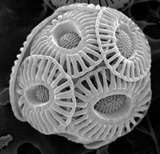Plankton response to Mediterranean acidification
The MedSeA project will define the susceptibility and resilience of key-stone species and endemic ecosystems to Mediterranean acidification and warming in WP3 and WP4. Analysis of our experimental results will allow projections of changes to the services that these ecosystems and species provide. Some services such as nurseries for fisheries, coastal protection, tourism, carbon sequestration, and climate regulation are likely to be very sensitive to climate change. To constrain projections, our consortium will take an interdisciplinary approach looking at physiological responses as well as ecological responses to environmental change.
The interaction between plankton and benthic studies and WP4 will be further strengthened by joint community level natural acidification experiments at Mediterranean CO2 vent sites
Specific objectives:
- Determine the effects of ocean acidification on target Mediterranean calcifying and non-calcifying planktonic organisms.
- Analyse synergistic effects of acidification and warming on key pelagic organisms.
- Determine effects of ocean acidification and warming on selected economically important species (including potential nuisance or harmful species).
- Identify threshold levels for pH and temperature (tipping points) at the organism and community level.
- Identify and quantify responses of fundamental Mediterranean biogeochemical processes to acidification and warming.

- Plankton Close Up











